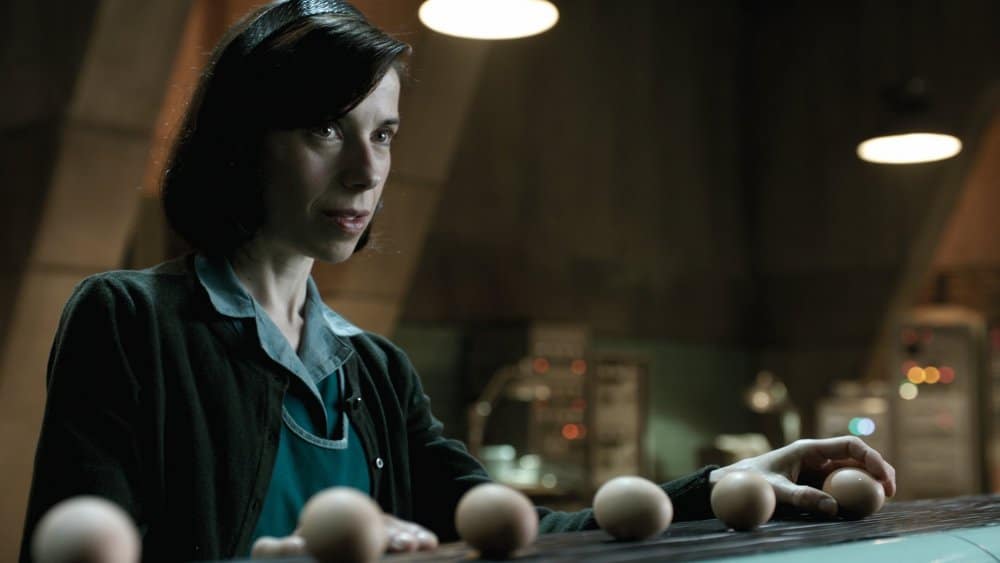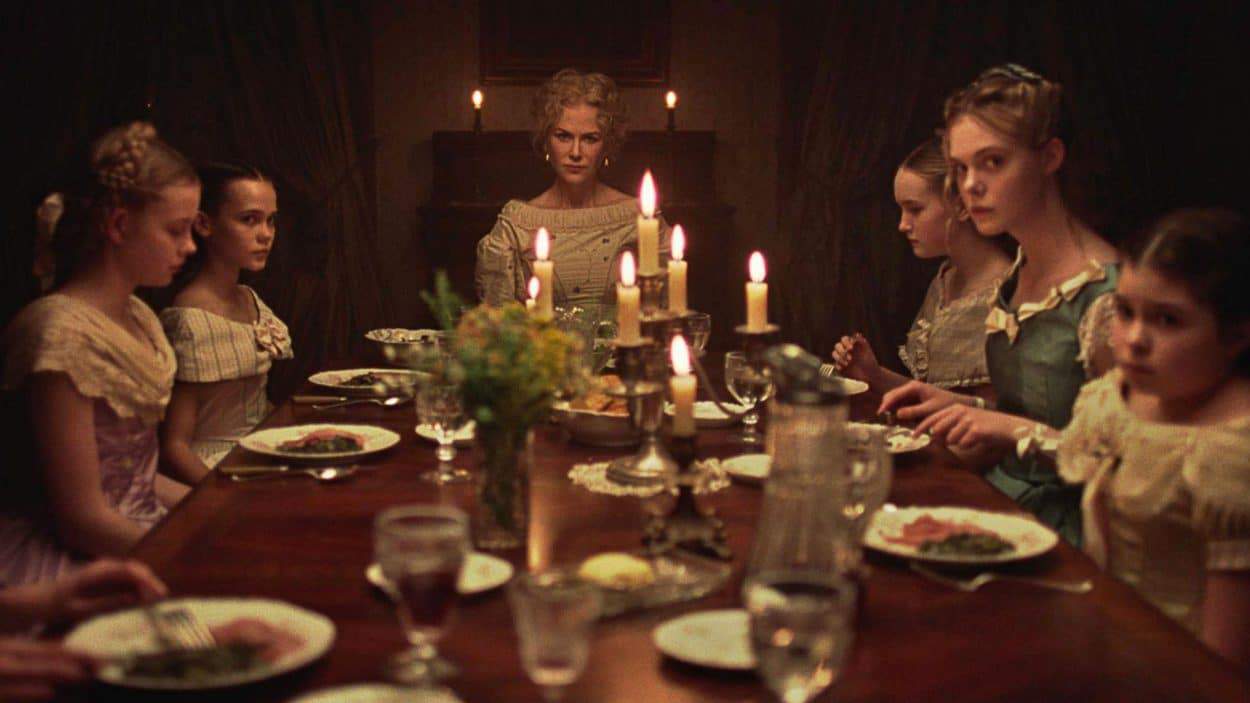By Lee Jutton
This year, food played almost as important a role in films as people did.
Every year my best friend and I plan a big Oscar party, basically as an excuse to dress up in our best evening wear and cook a bunch of delicious film-themed foods. Some years we’ve had to stretch to come up with dishes that can be connected to the year’s nominated movies — our infamous Ron Howard Chicken Wings stand out as one of the most random — but this year, there has been much cause for rejoicing. For 2017 was a great year for food in film, and especially in the films nominated for this year’s Oscars. In fact, I can’t think of another year in recent memory where so many crucial plot points in movies were also edible.
Without further ado, allow me to pay tribute to the dishes that deserve the most credit for making 2017 a delicious year at the movies.
Most Romantic Source of Protein: The Shape of Water
The Shape of Water offers one of the year’s most surprisingly sweet romances, between a mute cleaning woman named Elisa (Sally Hawkins) and a mysterious sea creature (Doug Jones). In the creature, Elisa finally finds someone who shares her lack of verbal communication and so doesn’t judge her for it, someone who sees her for who she truly is on the inside and not as someone flawed and broken.
After a lifetime of learning how to communicate nonverbally, it makes sense that Elisa is the only person who has the patience and creativity to try and communicate with the creature. She first attempts to make a connection with him by gently offering him one of the hardboiled eggs she brings every day; the eggs have a weirdly erotic connotation, as Elisa uses the time it takes for them to boil every morning to pleasure herself in the bathtub. As the days go by, Elisa brings more and more eggs for the creature and teaches him some of the sign language that she uses to communicate.
It’s kind of strange for two people to fall in love over one of the smelliest sources of protein out there, but strange is the best word to use to describe the romance at the center of The Shape of Water anyways. And thanks to Guillermo del Toro’s loving direction and Hawkins’s masterful performance, it works.
Sexiest Use of Fruit: Call Me By Your Name
Like The Shape of Water, the romance at the center of Call Me By Your Name sounds a bit creepy until you’ve watched the movie. Instead of a woman and a sea creature, it concerns a teenage boy, Elio (Timothee Chalamet) and the hunky older graduate student, Oliver (Armie Hammer), who has come to the family summer house in Italy to assist Elio’s professor father in his research.
Like most teenage boys, Elio is overflowing with hormones, and the steamy summer atmosphere — including a lot of shirtless days by the pool — cranks his desire up to eleven. He embarks on some misguided sexual shenanigans with a local girl, but the true object of his affections is Oliver. It is obvious to the audience that Elio and Oliver are immediately and irresistibly drawn to each other, but the awkwardness and illicitness of their situation mean that it takes most of the summer for them to finally come out and admit how much they want each other. At one point, while waiting in an attic room for a secret rendezvous with Oliver, Elio is so overcome with emotions that he grabs the peach on the table next to him and…well, you can guess the rest.
Call Me By Your Name is an swoon-worthy romance that perfectly captures the overwhelming rollercoaster of emotions that come with one’s first love. The lush Italian scenery and lilting musical score only add to the film’s sensual atmosphere. The peach scene is pretty hilarious — especially when Oliver walks in and finds the violated peach — but it also serves as a surprisingly poignant symbol of how deep Elio’s infatuation with Oliver runs into his bloodstream.
Least Sexy Use of Fruit: Girls Trip
Okay, Girls Trip is not nominated for any Oscars, but anyone who saw the hit comedy about four longtime friends rediscovering how much they mean to each other on a trip to New Orleans knows that Tiffany Haddish’s breakout role as loyal loose cannon Dina was deserving of a nomination. Also deserving of a nomination? Her ability to describe an oddball sex act using a banana and a grapefruit.
Over breakfast, Dina asks her friends if they have ever heard of “grapefruiting.” She then goes on to describe the act, using the fruit on the table as props. Essentially, you scoop out the middle of the grapefruit, put it around a man’s penis, and use it as an aid in performing a blowjob. Dina’s energetic performance of the act, using the banana as a substitute for a man, is impressive, albeit somewhat disturbing. But it’s nowhere near as disturbing as when Lisa (Jada Pinkett Smith) decides to attempt grapefruiting herself with the sexy young man, Malik (Kofi Siriboe), she brought back to the hotel.
Lisa’s hookup is so well endowed that she has to sneak out of the bedroom to grab not one, but two grapefruits. Before her friends can fully register their shock, Malik comes running out of the bedroom screaming, with only the grapefruits to give him any modesty. It turns out, grapefruiting is less sexy and more…stingy. Like, stingy. The scene is an absolute laugh riot, as is the rest of the film — an ode to female friendship punctuated with enough bawdy humor to make the men of The Hangover blush.
Best Use of Mushrooms for Controlling Men: Phantom Thread

Paul Thomas Anderson’s wonderfully weird ode to the mysterious way some relationships work is also a great food movie. Meals play pivotal roles in Phantom Thread, from the gigantic feast that “hungry boy” Reynolds Woodcock (Daniel Day-Lewis) orders when he first encounters Alma (Vicky Krieps), the waitress that will become his muse, to the way Reynolds is consistently triggered by Alma’s incredibly loud eating of breakfast, to the moment when Reynolds blows up when Alma cooks him asparagus in a different way than usual. (“Are you trying to kill me?”) Food is consistently used to signify how particular and stubborn Reynolds is in his habits. It is also used, by Alma, to try and rid him of this behavior — at least temporarily.
Frustrated with Reynolds’s unpleasant behavior, which no one else will challenge because they are unwilling to disrupt his genius, Alma sneaks some poisonous mushrooms that she picked into his tea. Not enough to kill him, mind you, but enough to make him sick to his stomach, and to abandon his imperious behavior so that Alma can coax him back to health. Once he is well again, Reynolds is so overwhelmed with gratitude to Alma that he immediately asks her to marry him.
But this is not the last we see of Alma’s mushrooms. In the final act of the film, Alma once again turns to her secret ingredient to force Reynolds to mend his ways. This time, Reynolds realizes mid-bite what Alma has done, and looks up at her in astonishment. But, rather than be furious with her, he is filled with admiration. Even as he gets ready to spend the night puking his guts up in the toilet, he is full of love for Alma. Is this what constitutes a normal relationship? No, but what Phantom Thread does is show us how people who seem unsuited for each other on the surface might work better together, and in more unusual ways, than anyone on the outside looking in could ever know.
Best Use of Mushrooms for Killing Men: The Beguiled
I would never have expected 2017 to give us not one, but two films that featured women feeding men poison mushrooms, but that’s just one of the many reasons why it was such a memorable year at the movies. The Beguiled, Sofia Coppola’s gauzy and pastel-hued remake of the 1971 film starring Clint Eastwood, also allows women to take the power they are given — in the kitchen — and use it to overpower the men that plague their existence.
In this case, the man is an injured Union soldier named John (Colin Farrell) who finds refuge in a mostly abandoned seminary for young ladies in the South. His arrival sends the isolated women into a tizzy, including sly student Alicia (Elle Fanning), romantic teacher Edwina (Kirsten Dunst), and tough headmistress Martha (Nicole Kidman). Sexual tensions ride high, and when an unfortunate incident leads John to become furious the women, they, feeling threatened, begin plotting to get rid of him. So, they plan a big dinner. And they cook up some mushrooms.
Watching John keel over at the dinner table while the film’s ghostly pale blonde women sit serenely around him is simultaneously spooky and hilarious. While there are plenty of issues with The Beguiled — including the way Coppola whitewashes over the racial conflicts inherent in the war her film takes place during — one cannot help but take some morbid joy in the vengeful climax. It highlights how women can be far more dangerous than one might think.
Best Argument for Going Vegetarian: Raw

Okay, Raw wasn’t even France’s official submission for the Best Foreign language Film Oscar this year (that was BPM, which didn’t cut) but not only was it one of my absolute favorite foreign language films of 2017, it was also the one that centered the most purely on appetites. Specifically, the appetites of young women and how frequently they are made to feel ashamed of those appetites by the powers that be in our society.
Justine (Garance Marillier) is a lifelong vegetarian who follows in the steps of her parents and older sister, Alexia (Ella Rumpf) by entering veterinarian school. While there, she undergoes many intense hazing rituals, including one where she is forced to eat a raw rabbit kidney. She turns to Alexia for help, insisting that their entire family is vegetarian, but Alexia not only denies it, she also eats a kidney herself. From there, things start to get weird.
Justine’s entire body begins to crave raw meat. When Alexia accidentally cuts off one of her fingers with a pair of scissors, Justine eats the finger. Alexia understands these impulses and even goes so far as to crash a passing car so that she and Justine can feast on the passengers within. But while Alexia is willing to own her unacceptable appetites, Justine is terrified of the taboos involved. Eventually, Alexia ends up in an asylum, while Justine attempts to create a normal life for herself in the outside world. But which sister is better off? The one who can be entirely herself, or the one forced to submerge her cravings and present a false face to the outside world? Raw might not involve food in the same way that the films above do, but it addresses hunger in the best way of them all.
The article The Food Oscars appeared first on Film School Rejects.
0 comments:
Post a Comment